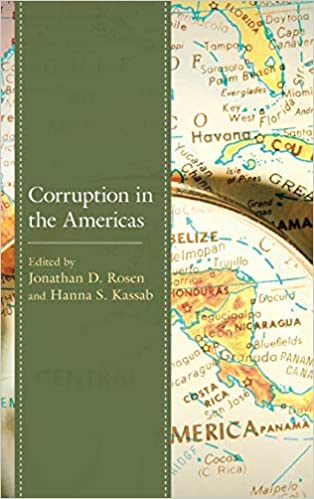Dr. Francia spent Election Night in the studio of WNCT in Greenville, offering his analyses and insights into the 2020 elections. Dr. Baumgartner appeared via Zoom on both WCTI (New Bern) and “Capital Tonight” on Raleigh’s Spectrum News 1, offering his analyses.
 Jody Baumgartner
Jody Baumgartner
Prof. Hugh Lee on “Nursing Home Liability for COVID Transmission and Death”
Prof. Hugh Lee has another article coming out in Elder Law Advisory dealing with Covid 19 and nursing home entitled “Nursing Home Liability for COVID Transmission and Death: Proposed and Enacted Federal and State Responses to the Pandemic.”
Soptlight on ECU Master of Public Administration: Dr. Sapna Varkey
Dr. Sapna Varkey completed her Master of Public Administration at East Carolina University. Afterwards, she completed her Ph.D. in Public Administration at North Carolina State University. She is currently an Assistant Professor at the University of Missouri-St. Louis. She is a nonprofit and public management scholar specializing in publicness. Her research identity focuses on organizational performance and the institutional pressures and organizational structures and practices that influence outcomes. Her research agenda explores how organizational characteristics affect service delivery and how to improve services. Sapna completed her Bachelor of Arts at the University of North Carolina at Chapel Hill and double majored in political science and public policy with a concentration in social justice.
Dr. Lockerbie’s 2020 Presidential Election Forecast
Every four years the American Political Science Association’s highly visible journal “PS: Political Science and Politics,” published several forecasts (predictions) of the presidential election. Inclusion in this issue of the journal is limited, but Dr. Brad Lockerbie has been one of those included for many election cycles.
His 2020 forecast, titled “Economic Pessimism and Political Punishment in 2020,” is not available.
Please see: https://www.cambridge.org/core/journals/ps-political-science-and-politics/article/economic-pessimism-and-political-punishment-in-2020/EB45A538B74A88A6D8B420FF70CE2DB1
Dr. Kassab’s Edited Book: “Corruption in the Americas”
Dr. Kassab, with Jonathan Rosen, has a new edited collection which analyzes trends of corruption in countries throughout the Americas. The contributors examine the main actors involved in corruption as well as the linkages between organized…
“For some states in Latin America, corruption is not simply an industry, but rather it is part of the political system. This collection studies the nature of corruption and its recent trends through expert contributions from scholars from the region who have diverse scholarly backgrounds, theoretical orientations, and methodologies. Through case studies of countries throughout the Americas, the contributors analyze the links between corruption and organized crime, the main actors involved in corruption, governmental responses to corruption, and the impact that corruption has on governmental institutions and people’s faith in them.”
At Amazon: https://amzn.to/3kqb3k2
At Publisher’s Site: https://rowman.com/ISBN/9781793627216/Corruption-in-the-Americas

Prof. High Lee’s Alabama Elder Law Soon to Be in 13th Edition
The 13th edition of Prof. Hugh Lee’s Alabama Elder Law, published by Thomson Reuters, will be coming out this December (2020). Continue to watch here for links to the book!
Dr. Kassab Participates in LiveStreaming Panel: “Spiraling “Out of Control? Armenia and Azerbaijan on the Brink”
On October 19, Dr. Kassab was part of the expert panel, sponsored by the Florida International University’s School of International and Public Affairs, which discussed the latest developments in the disputed Nagorno-Karabakh region and what they mean not only for Armenia and Azerbaijan but for the greater area.
See the Video: https://www.facebook.com/fiusipa/videos/342657023625446/
Dr. Francia’s Analyses in Local & State Media
Dr. Francia has been quite busy writing speaking to the media about the 2020 election, as well as the recent passing of Justice Ruth Bader Ginsburg. His comments have appeared in:
The Charlotte Observer:
https://www.charlotteobserver.com/news/politics-government/rnc-2020/article245377540.html https://www.charlotteobserver.com/news/politics-government/article245682065.html)
Local television, WITN and WNCT
https://www.witn.com/2020/09/29/political-expert-says-presidential-debate-unlikely-to-sway-votes/
https://www.witn.com/2020/09/30/president-trump-asked-to-clarify-debate-comments-on-white-supremacy-proud-boys/
https://www.witn.com/2020/09/09/pollsters-discuss-methodology-accuracy-ahead-of-november-elections/
https://www.wnct.com/local-news/local-political-experts-react-to-passing-of-justice-ginsburg/)
The podcast, What the Politics?
https://www.wnct.com/what-the-politics/what-the-politics-ep-2-presidential-debates/
Dr. Kassab to Participate in Panel Discussion, “Spiraling Out of Control?: Armenia and Azerbaijan on the Brink”
Renewed fighting between Armenia and Azerbaijan in and around the disputed Nagorno-Karabakh region dating to September 27, the worst in many years, has caused hundreds of civilian and military casualties on both sides. While members of the Minsk Group led by the U.S., France, and Russia have called for an end to the violence, other countries, including Turkey and even Iran, have become involved to varying degrees, raising the possibility that the conflict could spiral out of control into a bigger conflagration.
Join Dr. Kassab and an expert panel to discuss these latest developments and what they mean not only for Armenia and Azerbaijan but for the wider region.
See: https://calendar.fiu.edu/event/spiraling_out_of_control_armenia_and_azerbaijan_on_the_brink#.X4mfNFqJJ7c
(Virtual) Open House This Sunday (Oct. 18), from 2:00-5:00 p.m.
Please come and join our virtual booth at https://bit.ly/3dwBHF6.